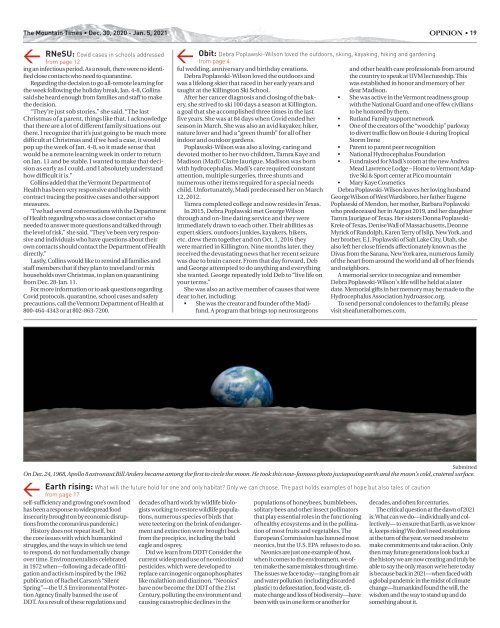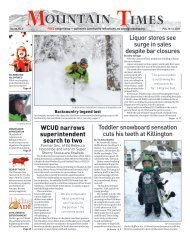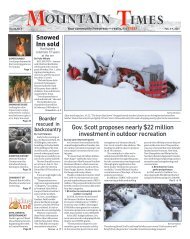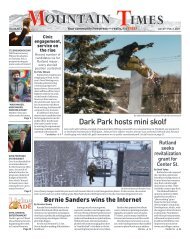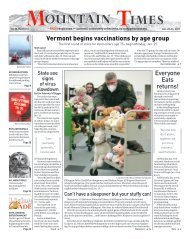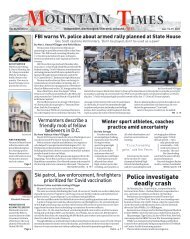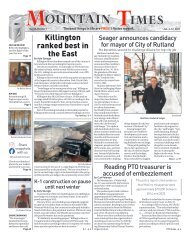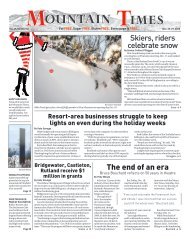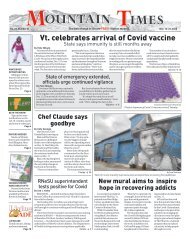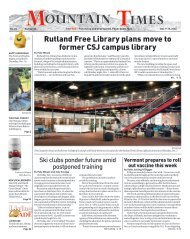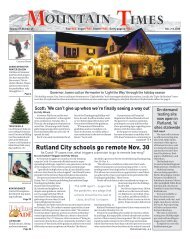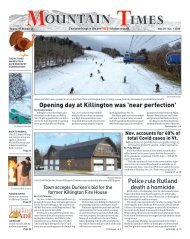Mountain Times - Vol. 49, No. 53 - Dec. 30, 2020 - Jan 2, 2021
You also want an ePaper? Increase the reach of your titles
YUMPU automatically turns print PDFs into web optimized ePapers that Google loves.
The <strong>Mountain</strong> <strong>Times</strong> • <strong>Dec</strong>. <strong>30</strong>, <strong>2020</strong> - <strong>Jan</strong>. 5, <strong>2021</strong> OPINION • 19<br />
><br />
><br />
RNeSU: Covid cases in schools addressed<br />
from page 12<br />
ing an infectious period. As a result, there were no identified<br />
close contacts who need to quarantine.<br />
Regarding the decision to go all-remote learning for<br />
the week following the holiday break, <strong>Jan</strong>. 4-8, Collins<br />
said she heard enough from families and staff to make<br />
the decision.<br />
“They’re just sob stories,” she said. “The last<br />
Christmas of a parent, things like that. I acknowledge<br />
that there are a lot of different family situations out<br />
there. I recognize that it’s just going to be much more<br />
difficult at Christmas and if we had a case, it would<br />
pop up the week of <strong>Jan</strong>. 4-8, so it made sense that<br />
would be a remote learning week in order to return<br />
on <strong>Jan</strong>. 11 and be stable. I wanted to make that decision<br />
as early as I could, and I absolutely understand<br />
how difficult it is.”<br />
Collins added that the Vermont Department of<br />
Health has been very responsive and helpful with<br />
contract tracing the positive cases and other support<br />
measures.<br />
“I’ve had several conversations with the Department<br />
of Health regarding who was a close contact or who<br />
needed to answer more questions and talked through<br />
the level of risk,” she said. “They’ve been very responsive<br />
and individuals who have questions about their<br />
own contacts should contact the Department of Health<br />
directly.”<br />
Lastly, Collins would like to remind all families and<br />
staff members that if they plan to travel and/or mix<br />
households over Christmas, to plan on quarantining<br />
from <strong>Dec</strong>. 28-<strong>Jan</strong>. 11.<br />
For more information or to ask questions regarding<br />
Covid protocols, quarantine, school cases and safety<br />
precautions, call the Vermont Department of Health at<br />
800-464-4343 or at 802-863-7200.<br />
Obit: Debra Poplawski-Wilson loved the outdoors, skiing, kayaking, hiking and gardening<br />
from page 4<br />
ful wedding, anniversary and birthday creations.<br />
Debra Poplawski-Wilson loved the outdoors and<br />
was a lifelong skier that raced in her early years and<br />
taught at the Killington Ski School.<br />
After her cancer diagnosis and closing of the bakery,<br />
she strived to ski 100 days a season at Killington,<br />
a goal that she accomplished three times in the last<br />
five years. She was at 84 days when Covid ended her<br />
season in March. She was also an avid kayaker, hiker,<br />
nature lover and had a “green thumb” for all of her<br />
indoor and outdoor gardens.<br />
Poplawski-Wilson was also a loving, caring and<br />
devoted mother to her two children, Tamra Kaye and<br />
Madison (Madi) Claire Jaurigue. Madison was born<br />
with hydrocephalus. Madi’s care required constant<br />
attention, multiple surgeries, three shunts and<br />
numerous other items required for a special needs<br />
child. Unfortunately, Madi predeceased her on March<br />
12, 2012.<br />
Tamra completed college and now resides in Texas.<br />
In 2015, Debra Poplawski met George Wilson<br />
through and on-line dating service and they were<br />
immediately drawn to each other. Their abilities as<br />
expert skiers, outdoors junkies, kayakers, hikers,<br />
etc. drew them together and on Oct. 1, 2016 they<br />
were married in Killington. Nine months later, they<br />
received the devastating news that her recent seizure<br />
was due to brain cancer. From that day forward, Deb<br />
and George attempted to do anything and everything<br />
she wanted. George repeatedly told Deb to “live life on<br />
your terms.”<br />
She was also an active member of causes that were<br />
dear to her, including:<br />
• She was the creator and founder of the Madifund.<br />
A program that brings top neurosurgeons<br />
and other health care professionals from around<br />
the country to speak at UVM lectureship. This<br />
was established in honor and memory of her<br />
dear Madison.<br />
• She was active in the Vermont readiness group<br />
with the National Guard and one of few civilians<br />
to be honored by them.<br />
• Rutland Family support network<br />
• One of the creators of the “woodchip” parkway<br />
to divert traffic flow on Route 4 during Tropical<br />
Storm Irene<br />
• Parent to parent peer recognition<br />
• National Hydrocephalus Foundation<br />
• Fundraised for Madi’s room at the new Andrea<br />
Mead Lawrence Lodge – Home to Vermont Adaptive<br />
Ski & Sport center at Pico mountain<br />
• Mary Kaye Cosmetics<br />
Debra Poplawski-Wilson leaves her loving husband<br />
George Wilson of West Wardsboro, her father Eugene<br />
Poplawski of Mendon, her mother, Barbara Poplawski<br />
who predeceased her in August 2019, and her daughter<br />
Tamra Jaurigue of Texas. Her sisters Donna Poplawski-<br />
Kreie of Texas, Denise Wall of Massachusetts, Deonne<br />
Myrick of Randolph, Karen Terry of Islip, New York, and<br />
her brother, E.J. Poplawski of Salt Lake City, Utah, she<br />
also left her close friends affectionately known as the<br />
Divas from the Sarana, New York area, numerous family<br />
of the heart from around the world and all of her friends<br />
and neighbors.<br />
A memorial service to recognize and remember<br />
Debra Poplawski-Wilson's life will be held at a later<br />
date. Memorial gifts in her memory may be made to the<br />
Hydrocephalus Association hydroassoc.org.<br />
To send personal condolences to the family, please<br />
visit sheafuneralhomes.com.<br />
Submitted<br />
On <strong>Dec</strong>. 24, 1968, Apollo 8 astronaut Bill Anders became among the first to circle the moon. He took this now-famous photo juxtaposing earth and the moon's cold, cratered surface.<br />
Earth rising: What will the future hold for one and only habitat? Only we can choose. The past holds examples of hope but also tales of caution<br />
><br />
from page 17<br />
self-sufficiency and growing one’s own food<br />
has been a response to widespread food<br />
insecurity brought on by economic disruptions<br />
from the coronavirus pandemic.)<br />
History does not repeat itself, but<br />
the core issues with which humankind<br />
struggles, and the ways in which we tend<br />
to respond, do not fundamentally change<br />
over time. Environmentalists celebrated<br />
in 1972 when—following a decade of litigation<br />
and activism inspired by the 1962<br />
publication of Rachel Carson’s “Silent<br />
Spring”—the U.S Environmental Protection<br />
Agency finally banned the use of<br />
DDT. As a result of these regulations and<br />
decades of hard work by wildlife biologists<br />
working to restore wildlife populations,<br />
numerous species of birds that<br />
were teetering on the brink of endangerment<br />
and extinction were brought back<br />
from the precipice, including the bald<br />
eagle and osprey.<br />
Did we learn from DDT? Consider the<br />
current widespread use of neonicotinoid<br />
pesticides, which were developed to<br />
replace carcinogenic organophosphates<br />
like malathion and diazinon. “Neonics”<br />
have now become the DDT of the 21st<br />
Century, polluting the environment and<br />
causing catastrophic declines in the<br />
populations of honeybees, bumblebees,<br />
solitary bees and other insect pollinators<br />
that play essential roles in the functioning<br />
of healthy ecosystems and in the pollination<br />
of most fruits and vegetables. The<br />
European Commission has banned most<br />
neonics, but the U.S. EPA refuses to do so.<br />
Neonics are just one example of how,<br />
when it comes to the environment, we often<br />
make the same mistakes through time.<br />
The issues we face today—ranging from air<br />
and water pollution (including discarded<br />
plastic) to deforestation, food waste, climate<br />
change and loss of biodiversity—have<br />
been with us in one form or another for<br />
decades, and often for centuries.<br />
The critical question at the dawn of <strong>2021</strong><br />
is: What can we do—individually and collectively—<br />
to ensure that Earth, as we know<br />
it, keeps rising? We don’t need resolutions<br />
at the turn of the year, we need resolve to<br />
make commitments and take action. Only<br />
then may future generations look back at<br />
the history we are now creating and truly be<br />
able to say the only reason we’re here today<br />
is because back in <strong>2021</strong>—when faced with<br />
a global pandemic in the midst of climate<br />
change—humankind found the will, the<br />
wisdom and the way to stand up and do<br />
something about it.


